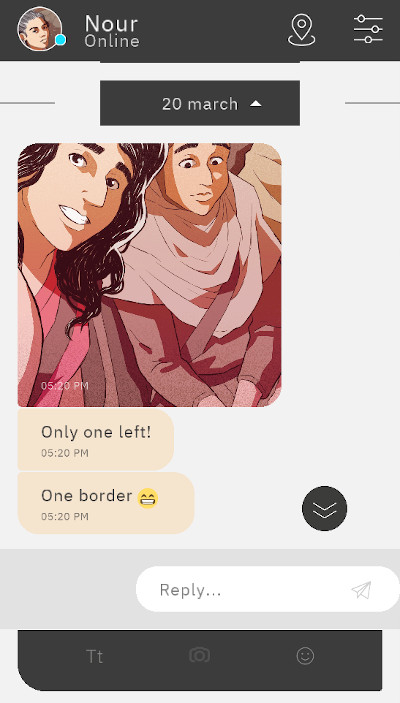Bury me, my Love
-
burymemylove.arte.tv
Databases Wikidata Online stores itch.io Steam - 2017 video game
-
buryme-1623735175966.jpg
As the player, you experience Nour's arduous journey through her husband's phone.Credit: The Pixel Hunt, Figs and ARTE France. Fair use.Source: own screenshotSource data licensing:
Data from Wikidata is available under Creative Commons CC-0.
lib.reviews is only a small part of a larger free culture movement. We are deeply grateful to all who contribute to this movement.Reviews
Please sign in or register to add your own review.
Empathy is not a gameBury Me, My Love is a choice-driven visual novel about the refugee crisis that has resulted from the Syrian Civil War. It is told in the form of text messages exchanged between a young woman, Nour, and her husband, Majd. Nour is trying to make her way to Europe, while Majd is forced to remain behind to take care of older family members.
According to the game’s website, the editorial team of the project includes the author of the Le Monde feature “Dans le téléphone d’une migrante syrienne” (“On the phone of a Syrian migrant”) and one of the migrant women portrayed in that story. While the game is not biographical, it attempts to present a realistic composite informed by real experiences.
Messages from your wife
You play as Majd. You click to advance the story, but you also have to make a significant number of choices throughout. Nour asks for your advice on everything—what mode of transportation she should use, where she should stash her cash, what kind of smuggler to trust, which countries to travel to.
The game has many endings, not all of them positive; when you are finished, you can review Nour’s journey on a map.

As the player, you experience Nour’s arduous journey through her husband’s phone. (Credit: The Pixel Hunt, Figs and ARTE France. Fair use.)The intention is clearly to humanize a crisis of unimaginable proportions. By experiencing Nour’s journey through a series of WhatsApp messages, we are invited to relate it to our own experiences. As developer Florent Maurin described his reaction to the Le Monde feature (which heavily relied on the text message format):
“It was really powerful as it felt very familiar to me and how I use WhatsApp to chat with my friends and family, sending emojis, jokes and pictures. But it was also very odd because they were discussing matters of life and death.”
Clearly, Bury Me, My Love attempts to replicate these sensations: familiarity, shock, confusion. And it often succeeds at building on the reading experience—waiting to hear from Nour can be genuinely nerve-wrecking. If you don’t mind spoilers, Florent Maurin’s GDC presentation gives some insights into the design philosophy and ethics behind the game.
Nightmarish choices
But the game is disconcerting in other ways in which a newspaper article is not. As the player, you are asked to make choices which may lead Nour to safety. But that can be seen as putting the impetus on refugees to make the “right” choices, rather than on governments.
You exclusively play as Majd, and all branching paths are the result of his messages. In spite of the best efforts of the developers, I felt that Nour was underdeveloped as a character, and would have liked to see the journey through her eyes. I would have also appreciated additional context, such as newspaper clippings from the time.
It took me about a couple of hours to play the game. Nour made it to safety in my first playthrough. The game suggested that I try other paths, but that seemed almost like an appeal to sadism, considering that some of these choices may well lead to Nour’s death.
While the game was included in itch.io’s massive Bundle for Palestinian Aid, it’s ordinarily sold as a commercial title ($5 on Steam), and proceeds do not go to any charitable cause. I played the game on Linux through Proton without issues.
The Verdict
Bury Me, My Love attempts to do something very important—to help us empathize with experiences that news reports usually keep at a comfortable distance. It ultimately falls short of this ambition, both because it is too much like a game (centering player choices) and not enough like one (restricting our perspective to Majd’s mobile phone). 3.5 stars, rounded down.
